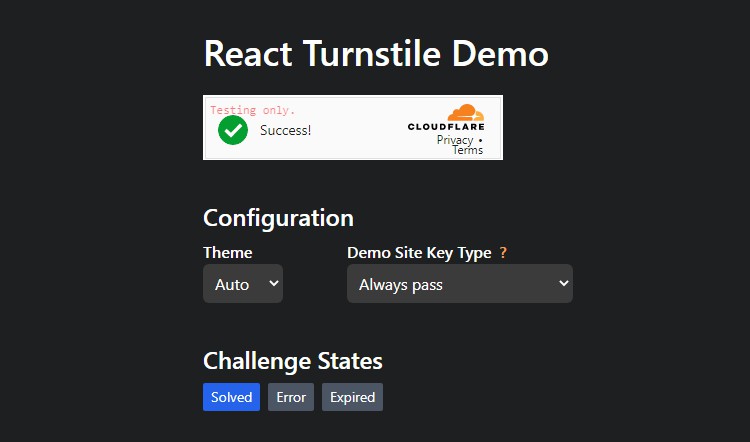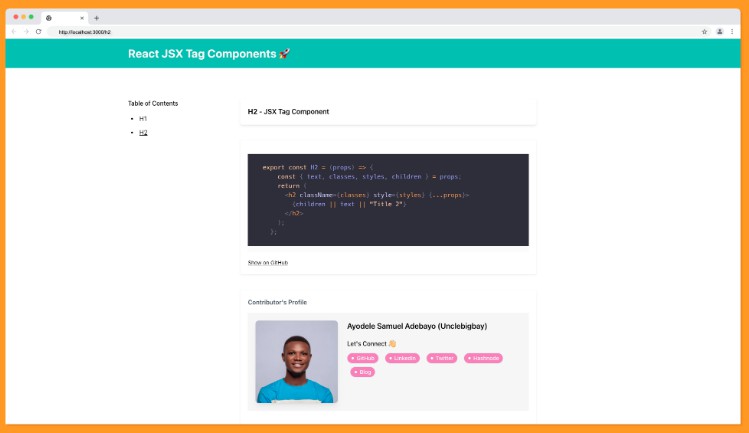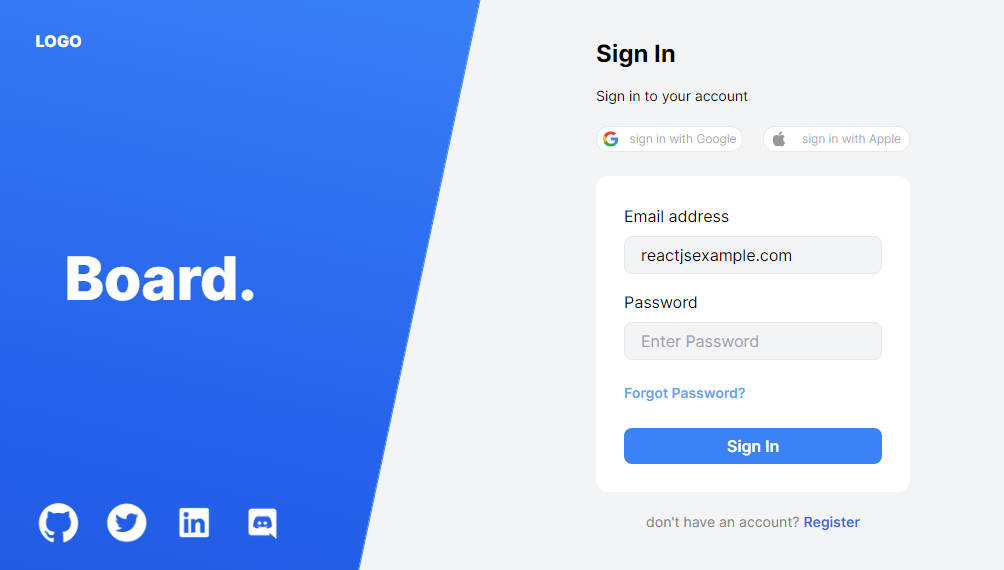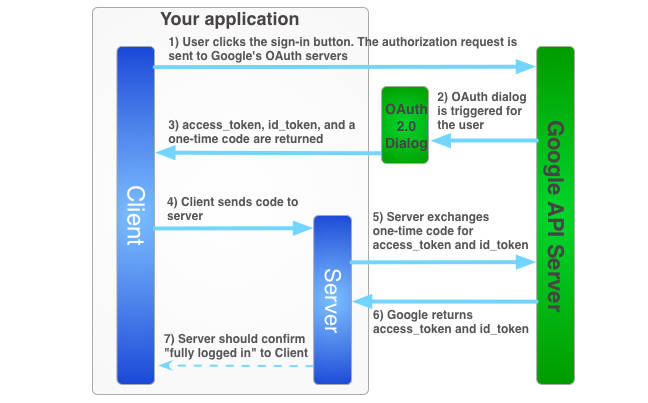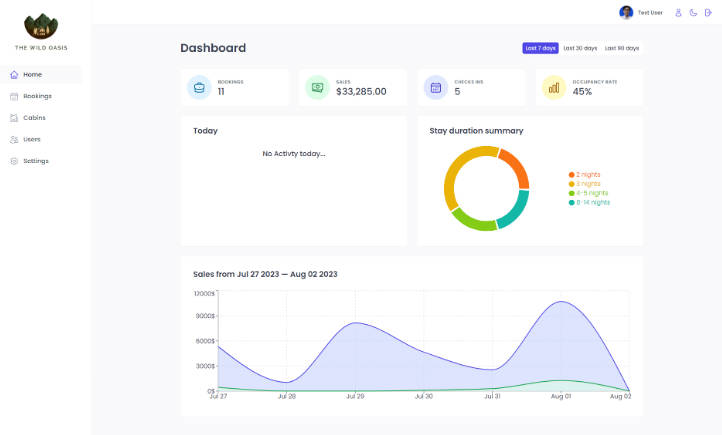Features
- ? smart verification with minimal user interaction
- ?️♀️ privacy-focused approach
- ? automatic script injection
- ⚡️ ssr ready
Demo
https://react-turnstile.vercel.app/
Install
-
Follow these steps to obtain a free site key and secret key from Cloudflare.
-
Install
@marsidev/react-turnstileinto your React application.# Whichever matches your package manager pnpm add @marsidev/react-turnstile npm install @marsidev/react-turnstile yarn add @marsidev/react-turnstile
Usage
The only required prop is the siteKey.
import { Turnstile } from '@marsidev/react-turnstile'
function Widget() {
return <Turnstile siteKey='1x00000000000000000000AA' />
}
Props
| Prop | Type | Description | Required |
|---|---|---|---|
| siteKey | string |
Your sitekey key, get one from here. | ✅ |
| options | object |
Widget render options. More info about this options below. | |
| scriptProps | object |
You can customize the injected script tag with this prop. It allows you to add async, defer, nonce attributes to the script tag. You can also control whether the injected script will be added to the document body or head with appendTo attribute. |
|
| onSuccess | function |
Callback that is invoked upon success of the challenge. The callback is passed a token that can be validated. | |
| onExpire | function |
Callback that is invoked when a challenge expires. | |
| onError | function |
Callback that is invoked when there is a network error. |
Render options
| Option | Type | Default | Description |
|---|---|---|---|
| theme | string |
'auto' |
The widget theme. You can choose between light, dark or auto. |
| tabIndex | number |
0 |
The tabindex of Turnstile’s iframe for accessibility purposes. |
| action | string |
undefined |
A customer value that can be used to differentiate widgets under the same sitekey in analytics and which is returned upon validation. This can only contain up to 32 alphanumeric characters including _ and -. |
| cData | string |
undefined |
A customer payload that can be used to attach customer data to the challenge throughout its issuance and which is returned upon validation. This can only contain up to 255 alphanumeric characters including _ and -. |
Read the docs to get more info about this options.
The widget is wrapped in a
div, so you can pass any validdivprop such asclassName,id, orstyle.
Script options
| Option | Type | Default | Description |
|---|---|---|---|
| nonce | string |
undefined |
Custom nonce for the injected script. |
| defer | boolean |
true |
Define if set the injected script as defer. |
| async | boolean |
true |
Define if set the injected script as async. |
| appendTo | string |
'head' |
Define if inject the script in the head or in the body. |
| id | string |
'cf-turnstile-script' |
Custom ID of the injected script. |
| onLoadCallbackName | string |
'onloadTurnstileCallback' |
Custom name of the onload callback. |
Examples
Rendering the widget:
import { Turnstile } from '@marsidev/react-turnstile'
function Widget() {
return <Turnstile siteKey='1x00000000000000000000AA' />
}
Rendering the widget with custom props:
import { Turnstile } from '@marsidev/react-turnstile'
function Widget() {
return (
<Turnstile
siteKey='1x00000000000000000000AA'
className='fixed bottom-4 right-4'
options={{
action: 'submit-form',
theme: 'light'
}}
scriptOptions={{
appendTo: 'body'
}}
/>
)
}
Managing widget rendering status:
import { useState } from 'react'
import { Turnstile } from '@marsidev/react-turnstile'
function Widget() {
const [status, setStatus] = useState()
return (
<Turnstile
siteKey='1x00000000000000000000AA'
onError={() => setStatus('error')}
onExpire={() => setStatus('expired')}
onSuccess={() => setStatus('solved')}
/>
)
}
Getting the token after solving the challenge:
import { useState } from 'react'
import { Turnstile } from '@marsidev/react-turnstile'
function Widget() {
const [token, setToken] = useState()
return (
<Turnstile
siteKey='1x00000000000000000000AA'
onSuccess={(token) => setToken(token)}
/>
)
}
Interacting with the widget:
import { useRef } from 'react'
import { Turnstile } from '@marsidev/react-turnstile'
function Widget() {
const ref = useRef(null)
return (
<>
<Turnstile ref={ref} siteKey='1x00000000000000000000AA'/>
<button onClick={() => alert(ref.current?.getResponse())}>
Get response
</button>
<button onClick={() => ref.current?.reset()}>
Reset widget
</button>
<button onClick={() => ref.current?.remove()}>
Remove widget
</button>
<button onClick={() => ref.current?.render()}>
Render widget
</button>
</>
)
}
Interacting with the widget (using TypeScript):
import { useRef } from 'react'
import { Turnstile, type TurnstileInstance } from '@marsidev/react-turnstile'
function Widget() {
const ref = useRef<TurnstileInstance>(null)
return (
<>
<Turnstile ref={ref} siteKey='1x00000000000000000000AA'/>
<button onClick={() => alert(ref.current?.getResponse())}>
Get response
</button>
</>
)
}
Validating a token:
// LoginForm.jsx
import { useRef, useState } from 'react'
import { Turnstile } from '@marsidev/react-turnstile'
export default function LoginForm() {
const formRef = useRef(null)
async function handleSubmit(event) {
event.preventDefault()
const formData = new FormData(formRef.current)
const token = formData.get('cf-turnstile-response')
const res = await fetch('/api/verify', {
method: 'POST',
body: JSON.stringify({ token }),
headers: {
'content-type': 'application/json'
}
})
const data = await res.json()
if (data.success) {
// the token has been validated
}
}
return (
<form ref={formRef} onSubmit={handleSubmit}>
<input type="text" placeholder="username"/>
<input type="password" placeholder="password"/>
<Turnstile siteKey='1x00000000000000000000AA'/>
<button type='submit'>Login</button>
</form>
)
}
// `pages/api/verify.js`
// this is an example of a next.js api route
// this code runs on the server
const endpoint = 'https://challenges.cloudflare.com/turnstile/v0/siteverify'
const secret = '1x0000000000000000000000000000000AA'
export default async function handler(request, response) {
const body = `secret=${encodeURIComponent(secret)}&response=${encodeURIComponent(request.body.token)}`
const res = await fetch(endpoint, {
method: 'POST',
body,
headers: {
'content-type': 'application/x-www-form-urlencoded'
}
})
const data = await res.json()
return response.json(data)
}
Check the demo and his source code to see a code similar to the above in action.
Check the docs for more info about server side validation.
As you might noted, there is three ways to get the token response from a solved challenge:
- by catching it from the
onSuccesscallback.- by calling the
.getResponse()method.- by reading the widget response input with name
cf-turnstile-response.
Contributing
Any contributions are greatly appreciated. If you have a suggestion that would make this project better, please fork the repo and create a Pull Request. You can also open an issue.
? Development
- Fork or clone this repository.
- Install dependencies with
pnpm install. - You can use
pnpm devto stub the library,pnpm buildto build the library orpnpm example:devto start the demo page in development mode.
Credits
Inspired by
License
Published under the MIT License.
